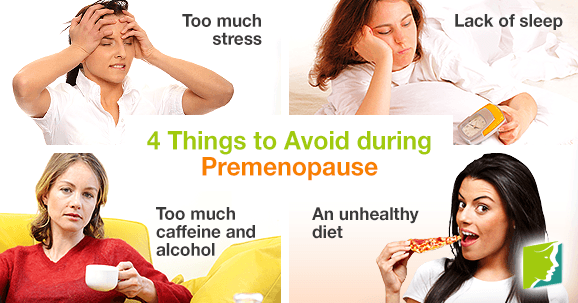Premenopause is defined as a woman's main reproductive years, from her first period until she starts noticing menopause symptoms. This usually lasts around 30 years, and during this time, there are many hormonal fluctuations happening inside the body. Some women suffer the effects of this more than others, including the distinctive symptom of premenopause, premenstrual syndrome (PMS). Although PMS is largely hormonal, there are certain external factors that can worsen the symptoms. Keep reading to find out more about some of the symptoms of premenopause and how to avoid them.

Premenopause Symptoms
Women can experience anywhere from none to all of the following symptoms, among others. These are felt in varying degrees, depending on the woman, and normally appear once per month.
- Sleep disturbances
- Loss of libido
- Bloating
- Cramps
- Mood swings
- Headaches or migraines
Below is a list of things to avoid during premenopause.
Too Much Stress
Stress can affect hormonal balance within the body and can make you more vulnerable to symptoms of premenopause. In fact, research by the National Institute of Health has shown that women who report feeling more stressed right before their period are more likely to suffer PMS symptoms. Therefore, it's important to build relaxing time into your life, which could mean breathing exercises, reading, joining a yoga class, taking naps, or other activities.
Lack of Sleep
Inadequate sleep is often a precursor to stress and one of the main causes of fatigue. Some psychological symptoms can be intensified if you're not getting enough sleep. As some premenopause symptoms can cause lack of sleep (for example, cramps, breast tenderness, or anxiety), this can be hard to achieve at times. Keeping work out of the bedroom is one way to make your brain associate your bed with rest and not stress-inducing activities. It might also help to keep your room tidy, cool, and dark when you are trying to sleep.
Too Much Caffeine and Alcohol
These substances can directly affect your mood, alcohol being a depressant and caffeine a stimulant. They can exacerbate insomnia, which is likely to make premenopause symptoms worse. Drinking caffeinated coffee or tea before bed is not conducive to sleep, so you may find it helpful to drink relaxing herbal teas instead. Beyond its effect on mood, too much alcohol can be dehydrating, making premenopausal headaches worse.
Unhealthy Diet
A diet high in processed and high-sugar foods and missing essential nutrients will likely have a negative effect on the physical and psychological symptoms of premenopause. Salty foods can increase bloating - a commonly-reported premenopause symptom - so it is best to avoid them. Instead of simple sugars, complex carbohydrates should form a main part of your diet; these can be found in foods like fruit, vegetables, and whole grains. Fruits and vegetables also contain nutrients that are essential for overall health and will ultimately help ease premenopause symptoms.
Premenopause lasts for a large portion of a woman's life, so many women are keen to reduce the intensity of their PMS symptoms. A healthy lifestyle will go a long way towards achieving this, although for very severe symptoms, healthy habits should be complemented with other treatments, such as herbal remedies or psychological therapy. In order to work out the optimal route for you, talk to your doctor, who can provide a personalized plan.
Sources
- National Health Service UK. (2015). Symptoms of premenstrual syndrome (PMS). Retrieved January 14, 2016, from http://www.nhs.uk/Conditions/Premenstrual-syndrome/Pages/Symptoms.aspx
- National Health Service UK. (2015). Treating premenstrual syndrome (PMS). Retrieved January 14, 2016, from http://www.nhs.uk/Conditions/Premenstrual-syndrome/Pages/Treatment.aspx
- Office on Women's Health. (2014). Premenstrual syndrome (PMS) fact sheet. Retrieved January 14, 2016, from http://www.womenshealth.gov/publications/our-publications/fact-sheet/premenstrual-syndrome.html#f
- Women's Health Research Institute. (n.d.). Stress could Worsen Premenstrual Symptoms. Retrieved January 14, 2016, from http://blog.womenshealth.northwestern.edu/2010/08/stress-could-worsen-premenstrual-symptoms/

